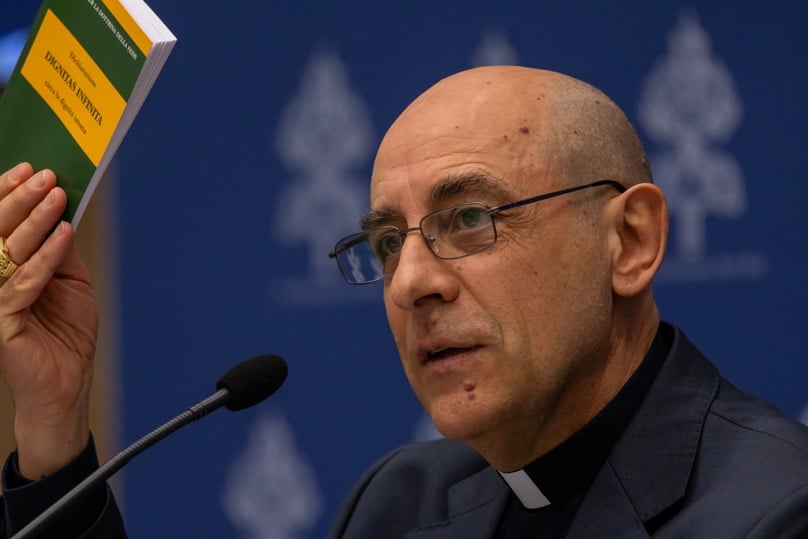
Dear Fr John Flader, I understand that the recent Vatican Declaration on human dignity mentions gender theory and sex changes as unacceptable in light of the Church’s teaching. Could you please clarify this?
The Declaration Dignitas Infinita of the Dicastery for the Doctrine of the Faith, issued on 2 April 2024 with the approval of Pope Francis, is a magnificent defence of the dignity of the human person, in light of the many current attacks on it.
The document first presents the philosophical, theological and scriptural foundations of human dignity, and then goes on to refute the many specific attacks on it.
For anyone wondering, as I did, why the document speaks of the “infinite” dignity of the human person, the expression comes from Pope St John Paul II in an address on 16 November 1980 in Osnabrück, Germany, to people living with various limitations or disabilities.
He used this expression to show how human dignity transcends all outward appearances and specific aspects of people’s lives. The recent declaration explains this, quoting Pope Francis, who has invited the church to “believe in a Father who loves all men and women with an infinite love, realising that ‘he thereby confers upon them an infinite dignity’” (Evangelii Gaudium, no. 178).
As regards gender theory, the declaration reaffirms the respect that every person should be accorded regardless of their sexual orientation, and it denounces every form of unjust discrimination against them on this account.
At the same time, it calls attention to attempts to introduce new rights in the area of gender which are not in accord with the 1948 UN Universal Declaration of Human Rights. It calls gender theory “extremely dangerous since it cancels differences in its claim to make everyone equal” (n. 56).
The declaration says that the scientific coherence of gender theory is the subject of considerable debate, and that gender theory’s advocacy of personal self-determination does not respect the church’s teaching that human life in all its dimensions, both physical and spiritual, is a gift from God that is to be accepted with gratitude.
Gender theory gives in to the age-old temptation to make oneself God (cf. n. 57). Another important aspect of gender theory is that it denies the greatest possible difference that exists between living beings: sexual difference, which makes possible the great miracle of the arrival of new human beings in the world (cf. n. 58).
What is more, the envisaging of a society without sexual differences eliminates the very anthropological basis of the family. The declaration says that all attempts to obscure the God-given sexual difference between man and woman are to be rejected.
Only by accepting this difference can persons fully discover themselves, their dignity and their identity (cf. n. 59).
It should be remembered that the Vatican already wrote at length about gender theory in the Congregation for Catholic Education’s 2019 document Male and female he created them” (cf. J. Flader, Question Time 6, q. 845).
As regards sex change, the declaration has only one paragraph, number 60. It begins by recalling that the dignity of the human body cannot be considered inferior to that of the person as such.
The body “serves as the living context in which the interiority of the soul unfolds and manifests itself, as it does also through the network of human relationships. Constituting the person’s being, the soul and the body both participate in the dignity that characterises every human.”
It is in the body that each person recognises himself or herself as generated by others, and through their bodies men and women can enter into a relationship capable of generating other persons.
Pope Francis has said that “creation is prior to us and must be received as a gift. At the same time, we are called to protect our humanity, and this means, in the first place, accepting it and respecting it as it was created” (Amoris Laetitia (2016), no. 56).
“It follows that any sex-change intervention, as a rule, risks threatening the unique dignity the person has received from the moment of conception.” This does not exclude operations to correct genital abnormalities.
